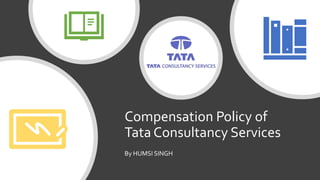
TCS Compensation Policy Explained
- 1. Compensation Policy of Tata Consultancy Services By HUMSI SINGH
- 2. The presentation covers the following topics: • Meaning and Introduction of Compensation • Introduction of TCS • Compensation Policy of the company • Conclusion
- 3. What is Compensation? What is Compensation Management? What is Compensation Policy? Compensation is the monetary benefit which is given to an employee or worker giving their services to an organization. Compensation inclu des components like salary, wages, bonuses etc. Compensation management is the practice of the organization that involves giving monetary as well as non-monetary rewards to the employees, in order to compensate for the time they allocate to their job. Compensation management involves “maximizing the return on human capital.” Compensation Policies are the collection of rules that govern the calculation of salary and benefit entitlement for all individuals working in an organisation.
- 4. What isTCS? • Tata Consultancy Services Limited (TCS) is an Indian multinational information technology (IT) service and consulting company headquartered in Mumbai, Maharashtra, India. It is a subsidiary of Tata Group and operates in 149 locations across 46 countries. • TCS is the largest Indian company by market capitalization. • It is the world's largest IT services provider.
- 5. Founded 1968; 51 years ago Founder Tata Sons and F.C. Kohli Area served Worldwide Key people Natarajan Chandrasekaran (Chairman) Rajesh Gopinathan (MD & CEO) Operating Profit US$5.3 billion (2019) Net Income US$4.5 billion (2019) Total Assets US$16.6 billion (2019) Total Equity US$13.2 billion (2019) Number of Employees 4,36,641 (Jun, 2019) Parent Tata Group
- 6. Compensation Policy ofTCS • The primary concept or theory behind the determination of Compensation policy is the Economic Value Added (EVA) Model. • TCS introduced Management consultancy division and adopted the EVA in 1999. • This model measured operating and financial performance of the organization. • There were strict basis on which the compensation was determined for the employees. • The aim was to assess contribution of the employees to the organization. • Fixed and variable pay components were determined. • The variable part of the salary was arrived after considering business unit EVA, corporate EVA, and also individual performance EVA.
- 8. Pay and Performance relationship amongstTCS employees. Employee expects pay Performance is evaluated Employee considers equity of performance and pay Employee performs job Feedback to employees Employees set new expectation s based on previous experience
- 9. Highlights of the Compensation Policy • Recognition of employee contribution was a major tool. Enjoying the work, job rotation, expression of appreciation, bigger desk, note of thanks, and challenging work assignments were the important ones. • Individual and group incentives were created to increase team work, reduce supervision, shorter training time etc. • Treats, knick-knacks, social acknowledgements, awards, tokens, on the job training, and good office environment became the plus point for the organization. • Another attraction became the cafeteria benefit plan, wherein, employees are given choice to select benefits by assessing their needs and preferences were introduced. For example: An employee choice health care insurance and other life insurance.
- 10. TCS salary information chart
- 12. Conclusion • Recruitment and retention of qualified employees is a common goal shared by many employers. To some extent, the availability and cost of qualified applicants for open positions is determined by market factors beyond the control of the employer. Compensation may also be used as a reward for exceptional job performance. Examples of such plans include: bonuses, commissions, stock, profit sharing, gain sharing. This is what we saw in the case of TCS.
- 13. ThankYou!!!